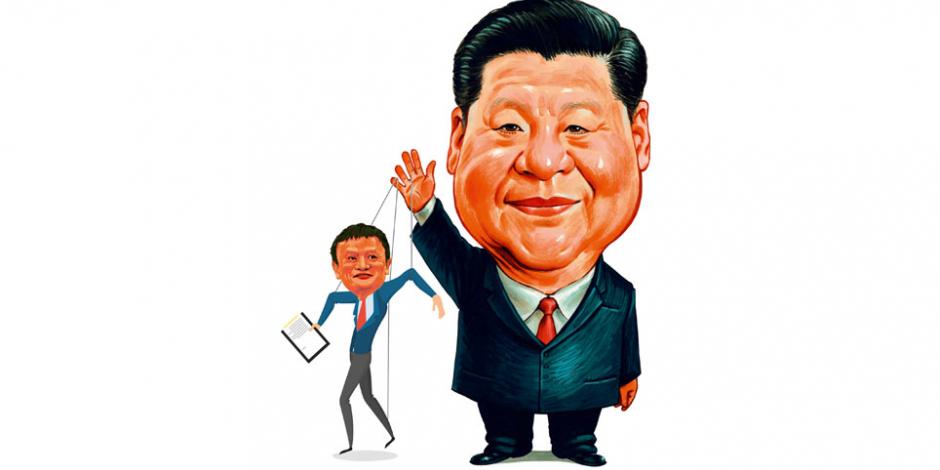Even teachers of English can become multibillionaires. At least they can in China. One such person is Jack Ma, with a net worth(Rein-)Vermögennet worth of around $47 billion (€40 billion) as of 12 April, according to Forbes magazine’s billionaires’ list. Ma is famous for being the founder of China’s internet giant Alibaba, including its numerous e-commerce and retailEinzelhandelretail platforms, and its AI (artificial intelligence)KI (künstliche Intelligenz)AI and fintechFinanztechnologiefintech companies.
China likes to describe itself as “constructing socialism with Chinese characteristics”. What exactly are these Chinese characteristics that can make such eye-wateringenorm, gigantischeye-watering wealth possible, the kind of opulence we associate mainly with capitalism à la USA? And how could Jack Ma’s plan of bringing his Ant online payment system to the stock exchangeBörsestock exchange in the world’s largest-ever IPO (initial public offering)BörsengangIPO be to scupper sth.etw. vereiteln, zunichte machescuppered so easily?
Vertical collectivism
Alibaba’s incredibleunglaublichincredible success and Jack Ma’s accrualAkkumulation, Anhäufungaccrual of personal wealth are examples of what can more readily be expected in a free market economy. But in fact, the kind of state capitalism (or socialist market economy, to use the Chinese term) that is practised in China — and which, curiously, made Jack Ma’s rise possible — has two important consequences. Firstly, the Chinese economy is quite obviously influenced by the economic planning of the state and its ownership of numerous corporations. According to some sources, state-owned enterprises account foretw. ausmachenaccount for around 30 per cent of employment and GDP (gross domestic product)BIP (Brutto- inlandsprodukt)GDP. But, secondly, these exist alongside to flourishflorierenflourishing domestic businesses in the private hands of skilful entrepreneurUnternehmer(in)entrepreneurs. This makes the Chinese variety of capitalism very different from the command economyPlanwirtschaftcommand economies of traditional communist states.
What is it that makes state capitalism in China possible? The answer is vertical collectivism: collectivist values, which protect the perceivedwahrgenommenperceived interests of a group as a whole, combined with a focusing of power in the hands of the few. The pragmatic acceptance of entrepreneurialism beyond the overtoffen(kundig)overt influence of the state is at least partially motivated by a tolerance of ambiguityMehrdeutigkeitambiguity — as long as the interests of the group are not thought to be harmed.
The Chinese variety of capitalism is very different from the command economies of traditional communist states
But when entrepreneurialism is felt to go too far, the state steps in with its unchallenged power. In the case of Ant, the state stopped the IPO — according to reports, on the top-downhier: von oben angeordnettop-down, personal instructions of President Xi. Shortly after, the state launched an antitrust investigationkartellrechtliche Untersuchungantitrust investigation into Alibaba’s allegedan-, vorgeblichalleged monopolistic behaviour. This was soon followed by China’s central bank ordering Jack Ma to to scale backetw. zurückschraubenscale back his fintech activities and return Ant to its origins as a payment services provider. Ant Group to cave inklein beigebencaved in immediately. And in April, Alibaba was fined $2.8 billion for to abuse sb/sth.jmdn./etw. missbrauchenabusing its market dominance.
The role of the state
Such investigations by the state are, of course, not unknown in individualist, small power distancemit geringer Machtdistanzsmall-power-distance societies such as the UK and the US. But such measures are relatively rare in free market economies, where the societal preference is for the individual and businesses to be left unshackledbefreit; hier: freiunshackled as far as possible. In its extreme form, the state merelylediglichmerely guarantees private ownership and ensures the smooth operation of what is believed to be a self-regulating market.
Where does this leave the social market economy or Rheinischer KapitalismusRhineland capitalismRhineland capitalism, such as that in Germany? Less individualist than the UK and the US, with similarly small power distance but more uncertainty avoidance, Germany to steer sth.etw. steuernsteers a middle course between free market capitalism and socialist forms of capitalism.
The widely held and practised belief is that society as a whole, the collective, and not just individual people and companies, should profit from economic freedom and initiative. The state’s role is to guarantee fair competition in the market but also to to pursue sth.etw. verfolgenpursue policies that serve the welfare and social security of all members of society. Perhaps that is one reason why, according to Forbes, Germany’s wealthiest individual is worth only around $39 billion, not Jack Ma’s $47 billion — or more than $60 billion as it was before the Chinese state’s intervention.
Collectivism
“Collectivism” is a term used by interculturalists to describe the valuing of the group over the individual in a society. A “collectivist” society is one in which people are brought up and socialized to be interdependent group members. Loyalty to the group, according to the lateverstorbenlate intercultural scholar(Geistes- und Sozial-)Wissenschaftler(in)scholar Geert Hofstede, is rewarded by the group protecting the individual. In collectivist societies, the state is likely to play a dominant role in the economic system in the interest of society as a whole, and management tends to focus on the management of the group rather than the individual. Collectivism is related to large power distancemit hoher Machtdistanzlarge power distance, as the example of China makes clear.
Neugierig auf mehr?
Dann nutzen Sie die Möglichkeit und stellen Sie sich Ihr optimales Abo ganz nach Ihren Wünschen zusammen.



